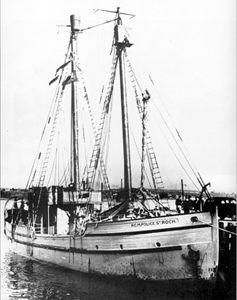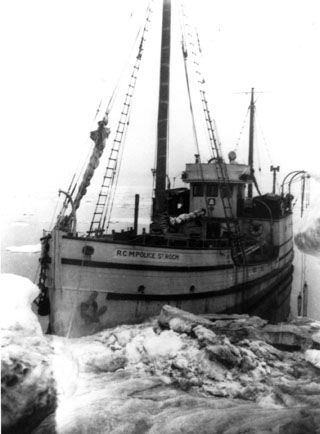Browse "Law Enforcement"
-
Article
Acheson Gosford Irvine
Acheson Gosford Irvine, soldier, police officer, prison warden (b at Québec C 7 Dec 1837; d there 9 Jan 1916). The third commissioner of the NWMP, Irvine's reputation was ruined by the North-West Resistance.
"https://d2ttikhf7xbzbs.cloudfront.net/A_G_Irvine.png" // resources/views/front/categories/view.blade.php
https://d2ttikhf7xbzbs.cloudfront.net/A_G_Irvine.png
-
Article
Aylesworth Bowen Perry
Aylesworth Bowen Perry, police officer (b at Violet, Ont 21 Aug 1860; d at Ottawa 14 Feb 1956). As commissioner of the NWMP, Perry transformed the police from a romantic frontier force into a modern national police force.
"https://d2ttikhf7xbzbs.cloudfront.net/Aylesworth_Bowen_Perry.jpg" // resources/views/front/categories/view.blade.php
https://d2ttikhf7xbzbs.cloudfront.net/Aylesworth_Bowen_Perry.jpg
-
Article
Bailiff
Bailiff, sheriff's deputy employed for the execution of judgements (eg, seizure of judgement debtor's goods, repossession of chattels, and evictions); also, an officer of the court having custody of prisoners under arraignment.
"https://development.thecanadianencyclopedia.ca/images/tce_placeholder.jpg?v=e9dca980c9bdb3aa11e832e7ea94f5d9" // resources/views/front/categories/view.blade.php
https://development.thecanadianencyclopedia.ca/images/tce_placeholder.jpg?v=e9dca980c9bdb3aa11e832e7ea94f5d9
-
Article
Edward Foster
Edward Foster, policeman, fingerprint pioneer (b near Stittsville, Ont 14 Nov 1863; d at Ottawa 21 Jan 1956). Foster joined the DOMINION POLICE as a constable in 1890. While at the St Louis World's Fair in 1904, his interest was awakened in the controversial science of fingerprint identification.
"https://development.thecanadianencyclopedia.ca/images/tce_placeholder.jpg?v=e9dca980c9bdb3aa11e832e7ea94f5d9" // resources/views/front/categories/view.blade.php
https://development.thecanadianencyclopedia.ca/images/tce_placeholder.jpg?v=e9dca980c9bdb3aa11e832e7ea94f5d9
-
Article
Ephrem A. Brisebois
Ephrem A. Brisebois, soldier, mounted policeman, registrar of land titles (b at South Durham, Qué 7 Mar 1850; d at Minnedosa, Man 13 Feb 1890).
"https://d2ttikhf7xbzbs.cloudfront.net/Ephrem_Brisebois.jpg" // resources/views/front/categories/view.blade.php
https://d2ttikhf7xbzbs.cloudfront.net/Ephrem_Brisebois.jpg
-
Article
Francis Dickens
Francis Jeffrey Dickens, North-West Mounted Police inspector (b at London, Eng 15 Jan 1844; d at Moline, Ill 11 June 1886), third son of Charles Dickens. In 1864, after numerous unsuccessful career starts, Dickens joined the Bengal Mounted Police in India.
"https://development.thecanadianencyclopedia.ca/images/tce_placeholder.jpg?v=e9dca980c9bdb3aa11e832e7ea94f5d9" // resources/views/front/categories/view.blade.php
https://development.thecanadianencyclopedia.ca/images/tce_placeholder.jpg?v=e9dca980c9bdb3aa11e832e7ea94f5d9
-
Article
Francis Joseph Fitzgerald
Francis Joseph Fitzgerald, Royal North-West Mounted Police inspector (b at Halifax 12 Apr 1869; d Yukon Territory Feb 1911).
"https://development.thecanadianencyclopedia.ca/images/tce_placeholder.jpg?v=e9dca980c9bdb3aa11e832e7ea94f5d9" // resources/views/front/categories/view.blade.php
https://development.thecanadianencyclopedia.ca/images/tce_placeholder.jpg?v=e9dca980c9bdb3aa11e832e7ea94f5d9
-
Article
Gilbert McMicken
Gilbert McMicken, businessman, politician, magistrate, police commissioner (born 13 October 1813 in Glenluce, Wigtonshire, Scotland; died 6 March 1891 in Winnipeg, MB). McMicken was head of the Western Frontier Constabulary, Canada’s first secret service, which was established in 1864 in response to the American Civil War. He was also the first commissioner of the Dominion Police, Canada’s first federal police body and forerunner of the RCMP, which was instituted in 1868 following the assassination of Thomas D’Arcy McGee. McMicken served in municipal government in Niagara, in the Legislative Assembly of the Province of Canada (1858–61) and in the Legislative Assembly of Manitoba.
"https://development.thecanadianencyclopedia.ca/images/tce_placeholder.jpg?v=e9dca980c9bdb3aa11e832e7ea94f5d9" // resources/views/front/categories/view.blade.php
https://development.thecanadianencyclopedia.ca/images/tce_placeholder.jpg?v=e9dca980c9bdb3aa11e832e7ea94f5d9
-
Article
Henry Larsen
Henry Asbjorn Larsen, mounted policeman, seaman, explorer (born 30 Sept 1899 in Hvaler, Norway; died 29 Oct 1964 in Vancouver). Inspired by the career of his countryman Roald Amundsen, he dreamed of exploring the Arctic. After a voyage to the Beaufort Sea, he became a Canadian citizen in 1927 and, in 1928, joined the Royal Canadian Mounted Police (RCMP).
"https://d2ttikhf7xbzbs.cloudfront.net/media/media/952964a6-ab2a-4881-ae8a-8a9768b67099.jpg" // resources/views/front/categories/view.blade.php
https://d2ttikhf7xbzbs.cloudfront.net/media/media/952964a6-ab2a-4881-ae8a-8a9768b67099.jpg
-
Editorial
Henry Larsen and the St. Roch
The following article is an editorial written by The Canadian Encyclopedia staff. Editorials are not usually updated.
"https://d2ttikhf7xbzbs.cloudfront.net/media/media/40d090e1-883d-4265-8a4d-1be76e74b76d.jpg" // resources/views/front/categories/view.blade.php
https://d2ttikhf7xbzbs.cloudfront.net/media/media/40d090e1-883d-4265-8a4d-1be76e74b76d.jpg
-
Article
James Farquharson Macleod
James Farquharson Macleod, police officer, judge (b on Isle of Skye, Scot 25 Sept 1836; d at Calgary 5 Sept 1894).
"https://d2ttikhf7xbzbs.cloudfront.net/media/media/f9dc98d5-ab5b-4c22-a263-d93badedcc89.jpg" // resources/views/front/categories/view.blade.php
https://d2ttikhf7xbzbs.cloudfront.net/media/media/f9dc98d5-ab5b-4c22-a263-d93badedcc89.jpg
-
Article
Canada’s Cold War Purge of 2SLGBTQ2+ from Public Service
Between the 1950s and the 1990s, the Canadian government responded to national security concerns generated by Cold War tensions with the Soviet Union by spying on, exposing and removing suspected 2SLGBTQ2+ individuals from the federal public service and the Canadian Armed Forces. They were cast as social and political subversives and seen as targets for blackmail by communist regimes seeking classified information. These characterizations were justified by arguments that people who engaged in same-sex relations suffered from a “character weakness” and had something to hide because their sexuality was considered a taboo and, under certain circumstances, was illegal. As a result, the RCMP investigated large numbers of people. Many of them were fired, demoted or forced to resign — even if they had no access to security information. These measures were kept out of public view to prevent scandal and to keep counter-espionage operations under wraps. In 2017, the federal government issued an official apology for its discriminatory actions and policies, along with a $145-million compensation package.
"https://d2ttikhf7xbzbs.cloudfront.net/media/media/24561e5f-6a40-423a-aae3-8324fa0b339e.jpg" // resources/views/front/categories/view.blade.php
https://d2ttikhf7xbzbs.cloudfront.net/media/media/24561e5f-6a40-423a-aae3-8324fa0b339e.jpg
-
Article
North-West Mounted Police
The North-West Mounted Police (NWMP) was the forerunner of Canada's iconic Royal Canadian Mounted Police. Created after Confederation to police the frontier territories of the Canadian West, the NWMP ended the whiskey trade on the southern prairies and the violence that came with it. They helped the federal government suppress the North-West Resistance and brought order to the Klondike Gold Rush. The NWMP pioneered the enforcement of federal law in the West, and the Arctic, from 1873 until 1920.
"https://d2ttikhf7xbzbs.cloudfront.net/media/media/9a255267-0aad-4dff-bdcd-57cfec136787.jpg" // resources/views/front/categories/view.blade.php
https://d2ttikhf7xbzbs.cloudfront.net/media/media/9a255267-0aad-4dff-bdcd-57cfec136787.jpg
-
Article
Sam Steele
Sir Samuel Benfield Steele, CB, KCMG, mounted policeman, soldier (born 5 January 1848 in Medonte, Canada West; died 30 January 1919 in London, England). As a member of the North-West Mounted Police, Steele was an important participant in the signing of Treaty 6 and Treaty 7, the construction of the Canadian Pacific Railway, the North-West Rebellion and the Klondike gold rush. His military career began as a private in the Red River Expedition, included service in the South African War as an officer commanding Lord Strathcona’s Horse and as a major general during the First World War.
"https://d2ttikhf7xbzbs.cloudfront.net/media/media/a64c2753-6c2c-4abe-a75b-d9e9202495e4.jpg" // resources/views/front/categories/view.blade.php
https://d2ttikhf7xbzbs.cloudfront.net/media/media/a64c2753-6c2c-4abe-a75b-d9e9202495e4.jpg
-
Article
Sheriff
Sheriff Sheriff In each county and judicial district in Canada sheriffs, appointed by the lieutenant-governor-in-council, serve processes (eg, writs of summonses); attend upon supreme and county court judges and maintain order in the courts (performed by constables); execute judgements, eg, seizing the judgement debtor's goods (performed by BAILIFFS); summon and supervise JURIES, and take custody of noncriminal prisoners.
"https://development.thecanadianencyclopedia.ca/images/tce_placeholder.jpg?v=e9dca980c9bdb3aa11e832e7ea94f5d9" // resources/views/front/categories/view.blade.php
https://development.thecanadianencyclopedia.ca/images/tce_placeholder.jpg?v=e9dca980c9bdb3aa11e832e7ea94f5d9
